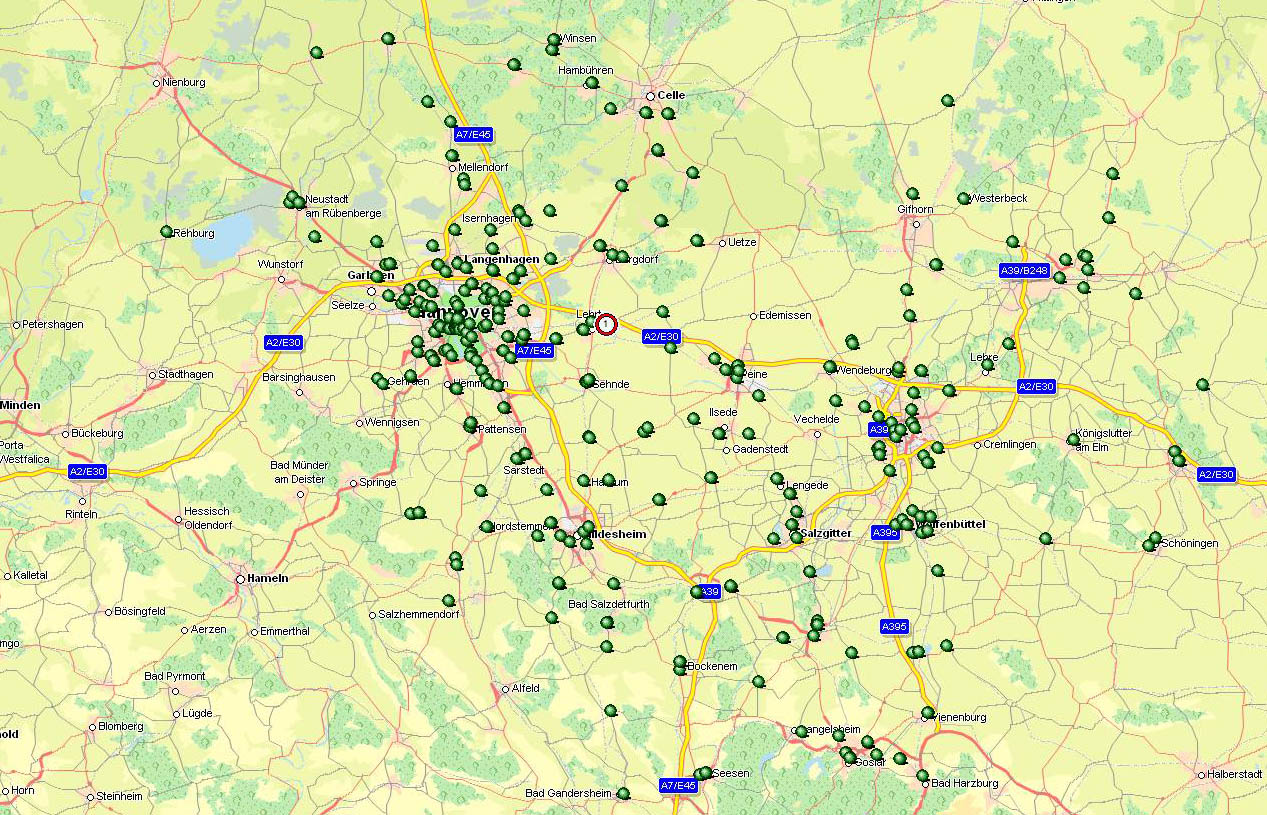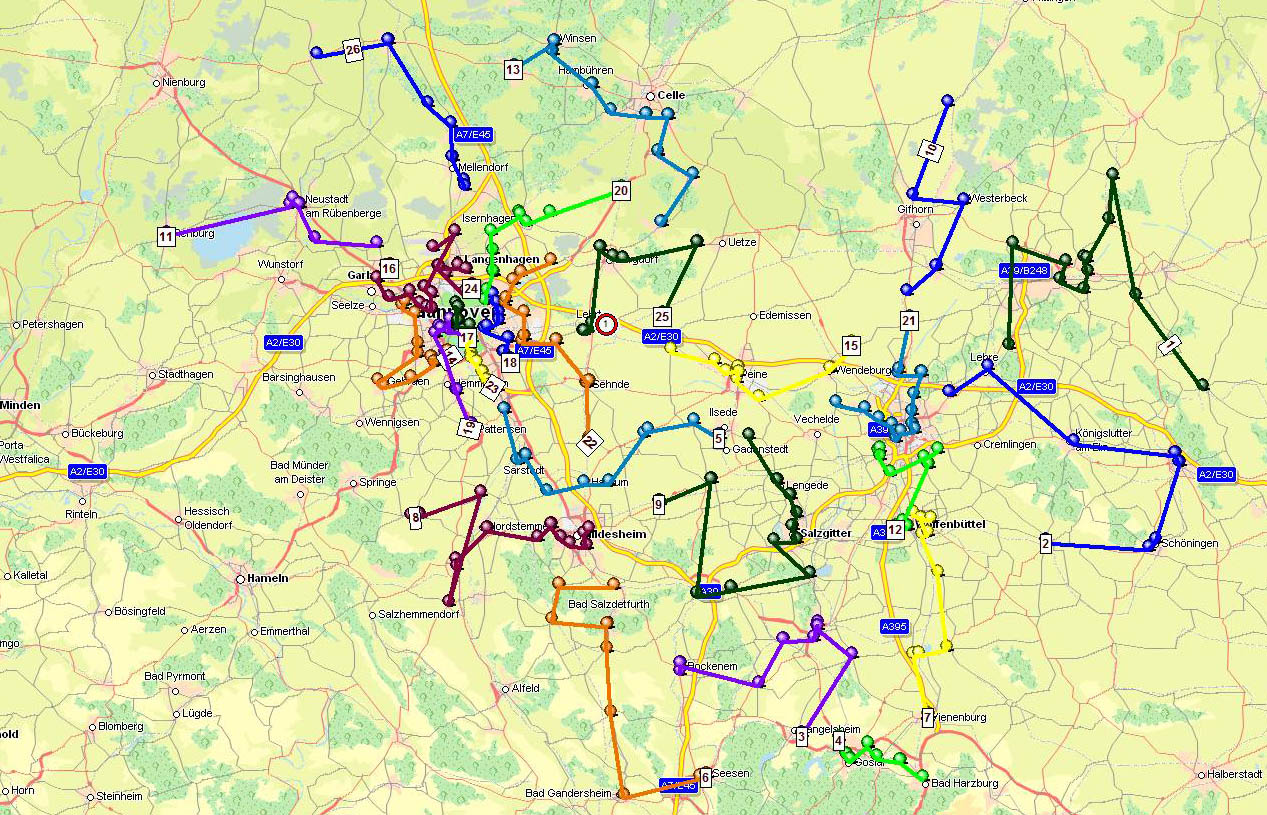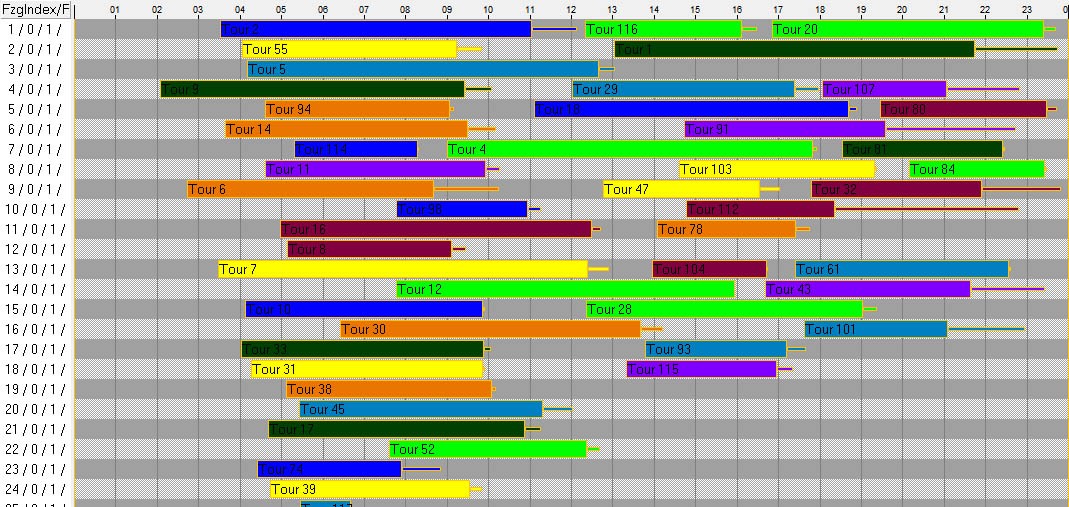The day-to-day work of a fleet manager is complex: when it comes to delivering goods, the ideal is optimal routes that maximise the use of loading space and working hours. In practice, however, a myriad of special features and influencing factors mean that routes deviate from the ideal. As a logistics consultancy, ORGAPLAN Logistik GmbH has many years of experience in operational tour optimisation, i.e. the creation of practical framework tour plans. It is important to focus not only on the theoretical optimum of a planning tool, but also on individual customer needs and the typical fluctuations and peculiarities of day-to-day business.
What exactly is the difference between route planning and trip planning?
Virtually everyone in this country uses the usual tools for planning routes in everyday traffic, such as navigation devices or apps on smartphones that use GPS to quickly guide you to your destination. When you arrive at your destination, you look for a new optimal route for your next trip and the route planning starts all over again. Add one or more stopovers at the start of your journey and you have a tour planner. In addition to road quality, modern route planning tools also take into account current traffic conditions, for example. When it comes to route planning in logistics, there are many other influencing factors.
Operational route planning in logistics
The route planning tool used by ORGAPLAN Logistik GmbH allows all relevant constraints to be taken into account in route planning. Typical factors influencing the optimal route plan are
- Customer specific store opening hours
- Vehicle size restrictions (pedestrian zone, yard situation)
- Volume-dependent service life
- Customer-specific dwell time requirements on site (distance from unloading point to store entrance)
- Vehicle type restrictions (weight, pallets, roll containers)
- Vehicle equipment characteristics (ambient, deep freeze, multi-chamber)
- Assortment combinations, mixed loading bans
- Road network, traffic volume, long-term road works
Binoy Chatterji
Don‘t hesitate. We look forward to seeing you!
+49 (0) 4102-66780
binoy.chatterji@orgaplan.net

Tour Optimisation: Reduce costs with an optimised tour plan
As a result, you get practical optimisation of your transport, with simultaneous route optimisation and cost optimisation of the routes driven.
Another typical focus of route optimisation is field service control. In contrast to master route planning described above, the focus here is on a different set of objectives. Read more about field service planning here.
Customers in the Hanover area (unscheduled)

Customers in the greater Hanover area (scheduled)

We are your partner when it comes to optimising freight costs, no matter how many customers you have to serve every day under special conditions, because we develop and optimise the master route plan for operational processing. The focus is always on the practicality of the route planning.
Efficient software for corporate route planning
In addition to optimising transport costs, another core element of route planning is the dynamic re-use planning of your vehicles: The tour planning software used assigns the maximum number of uses to each vehicle, taking into account the possible tour design and the duration of use in shift operation.

Objective:
The aim of any transport cost optimisation is to achieve a sustainable reduction in transport costs without any qualitative loss in a cost-optimal general tour plan as a basis for practical implementation. This means that the master tour plan can be adopted by the customer’s system for the operational process. The aim of the master tour plan is to ensure a high level of tour utilisation and an even use of resources, while at the same time keeping the daily adjustment effort as low as possible, i.e. only minor tour adjustments are required, e.g. in the case of seasonal overruns or holiday weeks.
Plan the optimal tour and increase fleet performance
Reasons for sub-optimal tour plans: Existing tour plans are often sub-optimal. This can be for a number of reasons, including the fact that tour structures have often grown historically, or that fleet performance is characterised by manually combined application requests that are much more influenced by drivers and/or customers than by cost-optimal tour planning. Overly strict customer specifications are not questioned or checked. Timings from warehouse logistics, such as picking starts and shift schedules, are also important factors influencing the overall route plan.
Procedure: For a defined delivery area of a location, master tours can be replanned as follows:
- Data transfer: First, ORGAPLAN Logistik GmbH takes over all the necessary data. Important are customer data (master data can be made anonymous on request), depot and customer coordinates, time or capacity delivery restrictions, vehicle fleet data and exemplary order data for a representative calendar week. Personnel and cost data complete the data entry requirements.
- Logging of tours: In order to reflect the actual situation as closely as possible, a tour log is created in which delivery and standstill times, delivery quantities, tour times and routes are recorded. The tour log can be used to check target times for delivery or downtime and to derive a general (downtime) time function. Customer groups can be categorised according to their delivery characteristics and additional downtimes can be assigned.
- Yard time analysis: Similar to the tour recording, the loading and unloading processes can also be determined by means of a yard time analysis. The result is all the time and costs that influence the master tour plan.
- Quantity comparison: The stop quantities of a monitored week should be carefully checked and, if necessary, adjusted to a representative average week. In the case of strong seasonality, it is useful to use a weak and/or strong week in addition to the average week as a basis for creating the master itinerary in order to develop a practicable master itinerary for seasonal periods.
Execution:
As soon as a coherent database is available, the sample week is automatically planned. This means that the theoretical optimisation potential compared to today’s delivery structure can be derived quite quickly. However, the practicalities are not known at this stage and will be worked out in detailed workshops on site by fine-tuning the general rounds and adapting them to as many of the specifics of day-to-day business as possible.
Frame tour planning as a service
Orgaplan Logistik GmbH uses modern software systems for the work steps described above and sees master tour planning as a service.
As durable as general tour planning must be, it requires regular optimisation. Especially if the company has grown over the years, it is important to adapt the tour structure to the new circumstances. For example, when customers and delivery areas are added or removed, or when the vehicle fleet, locations or order volumes change. However, many companies shy away from the cost and effort of professional tour planning. ORGAPLAN Logistik GmbH therefore offers its know-how as a service package.
If historically grown general tours can only be adapted to changed structures with a great deal of manual effort, dispatchers lose a lot of time that is needed elsewhere in day-to-day operations. An update of the master tours is overdue. But you don’t have to do everything yourself – the planning of tours should be delegated to professionals.
With our offer, logistics companies benefit from the use of route planning software. ORGAPLAN Logistik GmbH plans directly with your company’s data, taking into account all the restrictions required for general tours and developing your own tour plans on request. As a logistician, you have a concrete basis for strategic decisions and can quickly find approaches to improve operational delivery.
The service provided by ORGAPLAN Logistik GmbH has several advantages for logistics companies: You pay for a precisely defined, individually agreed scope of services. You don’t have to buy software licences and hardware for the optimisation task, or train and release your own human resources for planning. You gain clarity about general tours, vehicle deployments and locations – and most importantly, your transport costs. The improved general tours can be implemented immediately, making the tours more profitable and the fleet more evenly utilised.